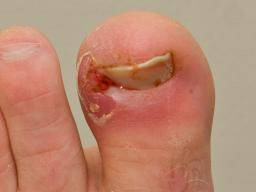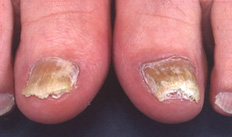Nails Treatment in Gurgaon
 Fingernails and toenails are made of a tough protein called keratin, Along with hair they are an appendage of the skin. Although an appendage, they have their own signs and symptoms which may relate to medical conditions.
Fingernails and toenails are made of a tough protein called keratin, Along with hair they are an appendage of the skin. Although an appendage, they have their own signs and symptoms which may relate to medical conditions.
Ingrown nails
This condition can affect either the fingers or the toes. In this condition, the nail cuts into one or both sides of the nail bed, resulting in infection. The movements involved in walking or other physical disturbances can contribute to the problem. Mild cases particularly in the absence of infection can be treated by trimming and rounding the nail. More advanced cases, which usually include infection, are treated by surgically removing the ingrown portion of the nail down to its bony origin and cauterizing the root, to prevent recurrence.
Onychomycosis It is a fungal infection of the nails. It can result in discoloration, thickening, chalkiness, or crumbling of the nails and is often treated by powerful oral medications. Mild onychomycosis sometimes responds to a combination of topical antifungal medication. For advanced onychomycosis, especially if more than one nail is infected, oral medication is preferred. Home remedies are often used, although their effectiveness is disputed.
It is a fungal infection of the nails. It can result in discoloration, thickening, chalkiness, or crumbling of the nails and is often treated by powerful oral medications. Mild onychomycosis sometimes responds to a combination of topical antifungal medication. For advanced onychomycosis, especially if more than one nail is infected, oral medication is preferred. Home remedies are often used, although their effectiveness is disputed.
Paronychia is a bacterial infection of skin folds where the nail and skin meet.
Koilonychia is when the nail curves upwards (becomes spoon-shaped). It may occur due to an iron deficiency.
Subungual hematoma
It occurs when trauma to the nail results in a collection of blood, or hematoma, under the nail. It may result from an acute injury or from repeated minor trauma such as running in undersized shoes.
Brittleness is associated with iron deficiency, thyroid problems and impaired kidney function.
Splitting and fraying are associated with psoriasis and deficiencies of folic acid, protein and Vitamin C.
Unusual thickness is associated with circulation problems.
Yellowing of the nail bed is associated with chronic bronchitis, lymphatic problems, diabetes, and liver disorders.
Dark nails are associated with B12 deficiency.
At Bindal Clinic, we specialize in advanced nails treatment in Gurgaon, providing expert care for a wide range of nail diseases and disorders. Led by Dr. Anil Bindal, our clinic offers personalized solutions for conditions such as fungal infections, ingrown nails, brittle nails, and nail discoloration. With a patient-centric approach, we use state-of-the-art techniques to restore nail health and appearance effectively. If you're seeking reliable and effective treatment for nail-related concerns, visit Bindal Clinic for comprehensive care tailored to your needs. Your journey to healthy nails starts with us!
Hair & Nail Clinic
Working Time
- Mon-Sat
9.30 AM - 1.30 PM
5.30 PM - 8.00 PM
Saturday
9.30 AM - 1.30 PM
Contact Info
-
Phone: 9810030327
9560400327 - bindalclinic@gmail.com
